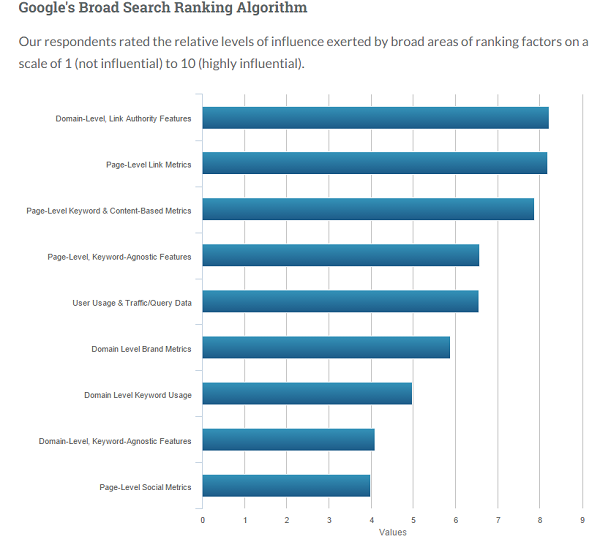Moz Ranks Ranking Factors
Following SearchMetrics' study on the factors that improve Google rankings, Moz actually ranked the factors. The studies saw eye-to-eye on technical factors, but differed on social.
Following SearchMetrics' study on the factors that improve Google rankings, Moz actually ranked the factors. The studies saw eye-to-eye on technical factors, but differed on social.
Yesterday, Moz released its largest-ever study on ranking factors. But unlike the Searchmetrics study from two weeks back, which simply described methods for getting ahead on Google, Moz actually ranked the ranking factors.
For its biennial study, the Seattle-based SEO platform interviewed 150 top search marketers on 90 different ranking factors, using correlation studies to measure them. Moz used its own data, as well as that from Ahrefs, DomainTools and SimilarWeb. The data came from the suggested queries from the 22 top-level categories in AdWords, which provides 800 queries per category. For each query, Moz looked at the top 50 search results on Google.
In a broad sense, respondents ranked the top features as domain-level link-authority features, such as quantity of links, trust and domain-level PageRank; page-level link metrics, such as quality of linking sources and anchor text distribution; and page-level keyword and content-based metrics, such as content relevance and on-page optimization of keyword use. On a scale of 1 to 10, the three were given scores of 8.22, 8.19 and 7.87, respectively.

On the flip side, domain-level agonistic features (domain name length, TLD extension, SSL certificate) and page-level social metrics (quantity and quality of Facebook shares, Google +1s and tweeted links) were ranked at the bottom, with respective scores of 4.09 and 3.98.
Factors in the middle, in descending order, were page-level, keyword-agnostic features (content length, readability, load speed); user usage and traffic/query data (data SERP engagement metrics, clickstream data, quantity and CTR of queries); domain-level brand metrics (offline usage of brand/domain name, mentions of the brand/domain in the media); and domain-level keyword usage (exact-match keyword domains, partial-keyword matches).
Moz confirmed Searchmetrics’ claim that “technical factors” are the most important of all. On a page level, the most important factors included keywords present in the title element and main content area of a page, the uniqueness of content, mobile-friendliness, topical relevance of linking pages and domains, and raw quality of links from high-authority sites. Top domain-level factors included uniqueness of content across the whole site and relevance and quality of linking domains.
However, Moz differed from Searchmetrics where social is concerned. The latter listed social signals as a ranking factor, an assertion that inspired a debate in our article’s comments. However, engagement was the highest-ranking social factor, according to Moz respondents, who only gave it a score of 3.87. The raw counts of Google+ shares, Tweets associated with the URL, and Facebook likes and shares were the only other social factors scored higher than 3.
Respondents ranked the factors that get pages higher in Google; they also looked at what will get your page buried. With a score of 8.26, “total number of unnatural links to page/subdomain” was judged as the most negative ranking factor, though the negative scores were generally closer together. Page links to spam, not being mobile-friendly, the amount of over-optimized anchor text, and thin and duplicate page content were all given scores between 7.3 and 7.74.
See Moz’s full study here.